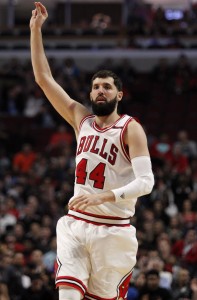If the Cavaliers had received assurances from LeBron James that he intends to remain with the franchise beyond the 2017/18 season, their approach to a Kyrie Irving trade might be much different, writes ESPN’s Adrian Wojnarowski. While the Cavs certainly haven’t given up hope of James remaining in Cleveland, the franchise wants to use an Irving trade to protect itself against his possible departure — that means focusing on acquiring a young potential star, rather than targeting veteran help for LeBron.
Initially, the Cavs’ desire in an Irving trade was to acquire young players and picks that could help the team down the road and to get pieces that could help the club contend immediately. However, that kind of massive return may not be available for the star point guard, forcing the Cavaliers to choose one path or the other. And with LeBron unwilling to commit, the Cavs are leaning toward prioritizing long-term pieces over short-term help.
As Wojnarowski details, Josh Jackson (Suns), Jayson Tatum (Celtics), Jamal Murray (Nuggets), and even Kristaps Porzingis (Knicks) are among the young players the Cavaliers have their eye on in trade talks. In his own piece on the situation in Cleveland, Steve Kyler of Basketball Insiders agrees that those four teams – Phoenix, Boston, Denver, and New York – are mentioned most frequently as trade partners, and continue to have discussions with the Cavs.
Here’s plenty more on the Irving situation:
- According to both Wojnarowski and Kyler, teams around the NBA believe that the Cavaliers will ramp up trade talks and get more serious about moving Irving in September, with training camps approaching.
- The Spurs have interest in Irving, but the fact that the Cavs are prioritizing young potential stars over veteran help means Cleveland doesn’t have much interest in the likes of LaMarcus Aldridge, Tony Parker, or Danny Green, says Wojnarowski.
- Although the Cavaliers are intrigued by Tatum, the Celtics have yet to make an official offer for Irving and the two sides haven’t formally discussed this year’s No. 3 overall pick, according to Wojnarowski. Adam Himmelsbach of The Boston Globe adds (via Twitter) that Boston has remained in touch with the Cavs throughout the process.
- The idea of including Porzingis in an Irving offer is currently a “non-starter” for the Knicks, per Wojnarowski. However, Woj adds there may still be some lingering tension between Porzingis and the franchise, and teams are wondering how emphatic the Knicks’ “no” really is — especially if the Cavaliers would be willing to take on Joakim Noah‘s contract.
- Wojnarowski reports that the Bucks have shown interest in Irving. However, with Giannis Antetokounmpo obviously untouchable, Milwaukee may not have a young star who makes sense for the Cavs.
- Although the Clippers have been mentioned as a possible landing spot for Irving, a league source tells Kyler that L.A. doesn’t appear to have the right combination of assets to appeal to the Cavs — a third team would be necessary, and even that may not be enough to make the Clips a serious contender for Irving.
